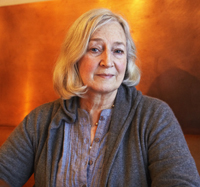By Ida Karlsson
"How could this man be appointed to the world’s most important job? He is definitely not up to the mark," Ahlenius, who was the head of the U.N.’s investigating arm, the Office of Internal Oversight Services (OIOS), until July last year, told IPS.
Her critique of Ban’s leadership is dealt with in-depth in a book recently released in Swedish. It has not yet been decided if the book ‘Mr. Chance’ will be translated into English. Asked for his comments, U.N. Spokesman Martin Nesirky said Monday: "We are aware of the book. We have dealt with the matter extensively last year. We do not have any further comments to make".
Ahlenius, former auditor-general of Sweden, was in 1999 one of the experts exposing corruption within the European Union when a succession of scandals led to the fall of the European Commission of Jacques Santer.
Called "Ms. Fearless" by former colleagues in the U.N. Secretariat, Ahlenius accuses Ban of being more interested in walking red carpets and giving speeches others have written rather than assuming the role as the chief administrative officer.
At meetings with U.N. senior advisors, Ban when returning from his travels, often speaks more about receptions and dinners he has been invited to or media coverage during events - rather than addressing political issues and follow up, according to Ahlenius.
"As the head of the Secretariat he is a catastrophe. He is uninterested and uncommitted," Ahlenius said.
Ahlenius also accuses the secretary-general of lacking transparency in management and of striving to control internal oversight. As an example she mentions that Ban - against established rules - blocked her from appointing a former U.S. attorney as head of the OIOS investigations unit. Ban has said that he acted in accordance with U.N. procedures.
When Ban took office he dismissed the managerial staff of former Secretary- General Kofi Annan. "There was no institutional memory left on senior level or in his own Executive Offices," Ahlenius said.
She was the only undersecretary-general not removed at that time as she had been appointed by the U.N. General Assembly and not by the secretary- general himself.
In her end-of assignment report in July last year Ahlenius sharply criticised Ban for causing the U.N. to fall apart. The report was filed as she stepped down from her post as the U.N.’s chief investigator. IPS was the only news organisation which had access to the entire 50-page report published exclusively on our website.
"I was the only one who was in a position to write such a report since I was not under the authority of the secretary-general and had a non-renewable contract. I did not have to bow and scrape for anybody," Ahlenius explained.
Her report was written over a period of five months. "I consulted five persons in central positions in the Secretariat who independently of each other reviewed the drafts for facts and for tone. They all agreed that the report gives a fair description of the state of affairs," she said.
At a press conference at U.N. Headquarters in New York last week Ban stressed that Ahlenius’s criticisms were based on unfounded allegations. Vijay Nambiar - the U.N.’s chief of staff - has also accused Ahlenius of distortion of facts.
"It is just a way to avoid a discussion. They will not find any inaccuracies in the report because there are none. They have not come back to substantiate such allegations," Ahlenius said.
At first her report was publicly commended by Ban Ki-moon as important, she explains. "But then I got an aggressive letter in return from Nambiar. I also received phone calls where I was warned that the circles around Ban Ki-moon would spare no effort to hit and hurt me in retaliation for my report. That is a sign of a depraved culture - to try to kill the messenger."
In December 2010 Ahlenius was informed that former colleagues at the U.N. had been invited to participate in a smear campaign against her.
But Ahlenius’s criticism of the secretary-general does not stand alone. The Norwegian Ambassador to the U.N. Mona Juul wrote a damning internal memo on Ban in 2009, deeming him weak, spineless, ineffective and lacking in charisma.
Juul also mentioned a whole range of crises where, according to her, Ban failed to make any impact - Myanmar, Sri Lanka, Democratic Republic of the Congo, Darfur, Somalia, Pakistan and Zimbabwe. She said she was not seeing him defending human rights, nor working for disarmament.
In November 2009 Ban was described as "The Master of Missteps" in the German news magazine Der Spiegel - he had recently spoken out positively on the death penalty (something his own organisation formally stands against), praised former U.S. President George W. Bush’s war in Iraq, and travelled to meet the leaders of Myanmar and Sudan but returned without tangible success.
Ban, a South Korean diplomat, has served as the U.N. secretary-general since 2007 and has not yet announced if he will run for re-election in 2011. Critics say he was appointed as the secretary-general because the super powers wanted an inoffensive leader.
"It would be pretty embarrassing if he was re-elected - ‘Ban Ki-Who’ or ‘Nowhere Man’ as he has been called by the media," Ahlenius told IPS.
(END)























No comments:
Post a Comment